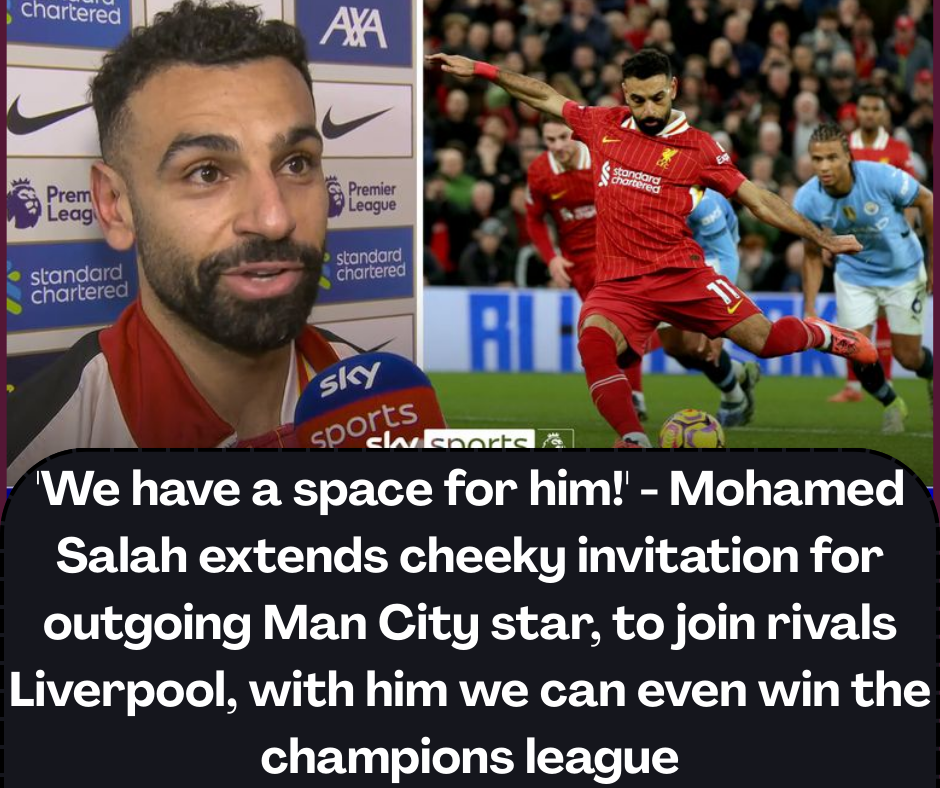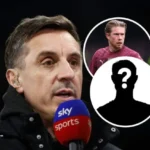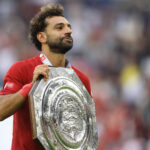‘We have a space for him!’ – Mohamed Salah extends cheeky invitation to join rivals Liverpool

In the immediate aftermath of Manchester City’s shocking 1-0 defeat to Crystal Palace in the FA Cup final at Wembley Stadium, football witnessed one of the most audacious and cheeky moments of player-to-player recruitment in recent memory. Mohamed Salah, Liverpool’s Egyptian superstar, extended a public invitation to Kevin De Bruyne, inviting the departing Manchester City legend to cross one of English football’s most bitter divides and join the Reds.
“I want to tell him congratulations for your career. He’s done a phenomenal job at City, and he was great for the league. I really wish him the best…and we have a space for him!” Salah declared to Sky Sports, delivering these words with the kind of sporting mischief that makes football as much about personality as it is about performance.
This seemingly lighthearted comment represents far more than mere banter between elite athletes. It encapsulates the shifting power dynamics in English football, the business realities facing aging superstars, and the psychological warfare that exists between Liverpool and Manchester City – two clubs that have defined the Premier League’s modern era. Salah’s invitation, while delivered with a smile, reveals deeper truths about football’s current landscape and the opportunities that arise when legendary players reach career crossroads.
The Context: De Bruyne’s Departure and Its Implications
Kevin De Bruyne’s announced departure from Manchester City at the end of the 2024-25 season represents one of the most significant player movements in recent Premier League history. The Belgian maestro, now 33 years old, has been the creative heartbeat of Manchester City for nearly a decade, orchestrating their attacking play with a precision and vision that has rarely been matched in English football.
De Bruyne’s contract situation had become increasingly precarious as the season progressed, with the midfielder entering the final year of his deal amid speculation about his future. The FA Cup final defeat to Palace seemed to crystallize his decision to seek new challenges, with Major League Soccer clubs, particularly Chicago Fire, reportedly leading the race for his signature.
The timing of De Bruyne’s departure announcement could hardly be more significant for Manchester City. Coming on the heels of their FA Cup disappointment and amid broader questions about the club’s direction under Pep Guardiola, losing their most creative player threatens to accelerate a decline that many observers believe has already begun. De Bruyne’s role in City’s numerous title triumphs cannot be overstated – his assists, goals, and overall influence on their style of play have been fundamental to their success.
For Liverpool, De Bruyne’s availability represents an unprecedented opportunity. Rarely do players of his caliber become available as free agents, and even more rarely do they consider moves between direct rivals. The prospect of adding De Bruyne’s creative genius to Liverpool’s already formidable attacking arsenal would represent a seismic shift in the Premier League’s competitive balance.
Salah’s Strategic Mind: More Than Just Banter
Mohamed Salah’s public courting of De Bruyne reveals the Egyptian’s sophisticated understanding of both football politics and media manipulation. By extending this invitation publicly, Salah achieved multiple objectives simultaneously: he demonstrated Liverpool’s ambition, unsettled Manchester City supporters, and positioned himself as a leader capable of attracting world-class talent to Anfield.
The timing of Salah’s comments was particularly astute. Speaking immediately after City’s FA Cup disappointment, when emotions were raw and De Bruyne’s future dominated headlines, Salah’s words carried maximum impact. His approach – respectful yet cheeky, complimentary yet opportunistic – struck the perfect tone for such a delicate situation.
Salah’s own evolution from prolific goalscorer to team leader and club ambassador has been one of the most interesting developments at Liverpool in recent years. His ability to speak authoritatively about transfer targets reflects his elevated status within the squad and his growing influence on sporting decisions. The fact that he felt comfortable making such public overtures suggests a player who understands his value and isn’t afraid to leverage it for the team’s benefit.
The Egyptian’s comments also reveal his competitive mentality and desire to strengthen Liverpool continuously. Despite the Reds’ success in recent years, including their Premier League triumph, Salah clearly recognizes that maintaining their position at the top requires constant improvement and strategic acquisitions. His pursuit of De Bruyne demonstrates an athlete who thinks beyond individual accolades to collective success.
The Liverpool Connection: A Perfect Tactical Fit
From a purely tactical perspective, De Bruyne’s potential addition to Liverpool would represent a mouth-watering prospect for manager Jürgen Klopp and the club’s supporters. The Belgian’s creative abilities would complement Liverpool’s high-intensity pressing game perfectly, providing the kind of incisive passing and set-piece expertise that could elevate an already impressive squad to new heights.
Liverpool’s current midfield, while effective, has occasionally lacked the kind of penetrative passing that De Bruyne provides instinctively. His ability to find space between the lines, deliver accurate long-range passes, and create chances from seemingly impossible positions would add a new dimension to Liverpool’s attacking play. The prospect of De Bruyne supplying passes to Salah, Darwin Núñez, and the rest of Liverpool’s forward line is enough to excite any neutral observer.
The Belgian’s set-piece expertise would also address one of Liverpool’s few remaining weaknesses. De Bruyne’s delivery from corners and free-kicks has been instrumental in Manchester City’s success, and his addition would provide Liverpool with a genuine threat from dead-ball situations that they have sometimes lacked.
Perhaps most intriguingly, De Bruyne’s experience and leadership qualities would perfectly complement Liverpool’s existing group dynamics. His ability to perform in high-pressure situations, demonstrated countless times during his Manchester City career, would be invaluable in crucial moments. The thought of De Bruyne orchestrating Liverpool’s attacks in Champions League knockout rounds or decisive Premier League encounters represents a tantalizing prospect for supporters.
The Rivalry Factor: A Move That Would Shock Football
The prospect of Kevin De Bruyne joining Liverpool from Manchester City would represent one of the most shocking transfers in Premier League history, comparable to Sol Campbell’s move from Tottenham to Arsenal or Carlos Tévez’s controversial switch from Manchester United to Manchester City. The rivalry between Liverpool and City, while more recently developed than some traditional enmities, has become one of the defining narratives of modern English football.
The two clubs have traded Premier League titles, Champions League disappointments, and memorable encounters throughout the past decade. Their contrasting philosophies – Liverpool’s emotional intensity versus City’s clinical precision – have created compelling storylines and unforgettable matches. De Bruyne crossing this divide would fundamentally alter the dynamic between these two powerhouses.
For Manchester City supporters, losing De Bruyne to any club would be painful, but seeing him join Liverpool would represent a particularly bitter pill to swallow. The Belgian has been synonymous with City’s success during their dominant period, and his departure to a direct rival would symbolize the end of an era in the most dramatic fashion possible.
Liverpool supporters, meanwhile, would welcome such a transfer as validation of their club’s continued attractiveness to elite players. Securing a player of De Bruyne’s caliber from their rivals would demonstrate Liverpool’s superior pull and ambition. The psychological impact of such a signing would extend far beyond the tactical benefits, sending a clear message about the shift in power dynamics within English football.
The Financial Dynamics: Free Agency and Market Value
De Bruyne’s potential availability as a free agent adds another layer of intrigue to this situation. In an era where transfer fees for elite players regularly exceed €100 million, the possibility of acquiring a player of his caliber without a transfer fee represents extraordinary value. For Liverpool, this financial advantage would be particularly appealing given their traditionally more cautious approach to the transfer market compared to Manchester City.
The only costs involved would be De Bruyne’s wages, signing bonuses, and agent fees – significant expenses but far less than the total package required for most elite transfers. This financial flexibility would allow Liverpool to offer competitive terms while maintaining their broader transfer strategy for other positions.
De Bruyne’s market value, even at 33, remains substantial due to his unique skill set and proven track record. His ability to influence games at the highest level, demonstrated consistently throughout his Manchester City career, means that clubs are willing to pay premium wages for his services. The financial package offered by potential suitors will likely be the determining factor in his final decision.
Liverpool’s improved financial position, bolstered by recent commercial successes and consistent Champions League participation, puts them in a strong position to compete with other interested parties. Their ability to offer both competitive terms and immediate opportunities for success could prove decisive in any potential negotiations.
The Age Factor: Risk and Reward
At 33, De Bruyne’s age represents both the primary concern and the main opportunity in any potential transfer. Critics might argue that investing heavily in a player approaching the twilight of his career carries significant risks, particularly given the physical demands of the Premier League. However, De Bruyne’s playing style, which relies more on vision and technique than pace or stamina, suggests his abilities could remain effective for several more seasons.
Examples of successful late-career moves abound in football history. Players like Andrea Pirlo, Claudio Marchisio, and more recently, Luka Modrić have demonstrated that elite midfielders can maintain high performance levels well into their thirties. De Bruyne’s meticulous approach to fitness and professionalism suggests he could follow a similar trajectory.
The short-term nature of any potential contract would also appeal to Liverpool. Rather than committing to a long-term deal that might become burdensome, they could acquire De Bruyne’s services for two or three seasons while transitioning to younger alternatives. This approach would provide immediate impact while maintaining future flexibility.
Furthermore, De Bruyne’s presence would accelerate the development of Liverpool’s younger players. His experience, leadership, and technical ability could help nurture the next generation of midfielders, providing value that extends beyond his direct contributions on the pitch.
Alternative Destinations: The MLS Factor
While Salah’s invitation captured headlines, the reality is that Major League Soccer represents De Bruyne’s most likely destination. The American league’s growing reputation as a comfortable landing spot for aging European stars, combined with attractive financial packages and reduced physical demands, makes it an appealing option for the Belgian.
Chicago Fire have been most prominently linked with De Bruyne, reportedly offering a substantial contract that would make him one of the highest-paid players in MLS history. The lifestyle benefits of living in the United States, combined with the opportunity to be a central figure in American soccer’s continued growth, represent compelling arguments for a move across the Atlantic.
The MLS option also allows De Bruyne to maintain his legendary status at Manchester City while avoiding the complications that would inevitably arise from joining a Premier League rival. His legacy at City remains untarnished, while he can embark on a new adventure in a different football culture.
However, the competitive element that drives elite athletes might make the MLS option less appealing than continuing to compete at the highest level in Europe. De Bruyne’s comments about potentially remaining in the Premier League suggest he hasn’t entirely dismissed the possibility of staying in English football.
The Broader Implications: Premier League Power Shifts
Salah’s pursuit of De Bruyne reflects broader changes in the Premier League’s competitive landscape. Manchester City’s recent struggles, combined with Liverpool’s sustained excellence, have created opportunities for player movements that would have been unthinkable during City’s peak years under Pep Guardiola.
The potential transfer would symbolize a passing of the torch from City’s golden generation to Liverpool’s current iteration. While City dominated the late 2010s and early 2020s, Liverpool’s consistent performance and attractive playing style have positioned them as the preferred destination for elite players seeking both success and legacy-building opportunities.
This power shift extends beyond individual transfers to broader questions about English football’s future direction. The sustainability of different models – City’s heavy investment versus Liverpool’s more balanced approach – continues to be tested, and high-profile player movements provide important data points in this ongoing debate.
Media and Fan Reactions: The Ripple Effects
Salah’s comments generated immediate and intense reactions across social media platforms and traditional journalism outlets. Manchester City supporters expressed outrage at what they perceived as disrespectful behavior, while Liverpool fans applauded their star’s boldness and ambition. The incident highlighted the passionate emotions that drive football fandom and the power of individual players to shape narratives.
The media response was equally polarized, with some outlets praising Salah’s honesty and humor while others criticized him for potentially undermining professional relationships. The incident provided endless material for sports television shows, podcasts, and newspaper columns, demonstrating the public appetite for drama and controversy in football.
These reactions reveal the complex relationship between players, clubs, and supporters in modern football. While club loyalty remains important, the increasing prominence of individual player brands creates situations where personal relationships and public statements can transcend traditional boundaries.
Tactical Analysis: How De Bruyne Would Fit at Liverpool
From a tactical standpoint, De Bruyne’s integration into Liverpool’s system would require careful consideration from Jürgen Klopp and his coaching staff. The German manager’s high-intensity pressing game demands specific physical and mental attributes, and adapting these requirements for a 33-year-old playmaker would present interesting challenges.
De Bruyne’s role would likely be more specialized at Liverpool than it was at Manchester City, focusing primarily on creative responsibilities while others handle more defensive duties. His positioning between the lines could unlock defensive systems that have successfully frustrated Liverpool in recent encounters, providing a new dimension to their attacking play.
The Belgian’s set-piece expertise would address a long-standing area for improvement at Anfield. Liverpool’s conversion rate from corners and free-kicks has been inconsistent, and De Bruyne’s proven ability in these situations could provide crucial marginal gains in tight matches.
His experience in high-pressure situations would also prove invaluable. Having performed consistently in Champions League knockout rounds and title-deciding matches, De Bruyne would bring a calming presence and clutch mentality that could benefit Liverpool in crucial moments.
Contract Considerations and Financial Fair Play
The financial aspects of any potential De Bruyne transfer extend beyond simple wage negotiations to broader considerations about Financial Fair Play regulations and squad balance. Liverpool would need to structure any deal carefully to maintain compliance with UEFA and Premier League financial rules.
As a free agent, De Bruyne would represent excellent value from an amortization perspective, with no transfer fee to spread across the contract length. This accounting advantage would allow Liverpool to offer competitive wages while maintaining financial flexibility for other transfers.
The impact on Liverpool’s existing wage structure would require careful management. While De Bruyne’s addition would likely command premium wages, the club would need to ensure that this doesn’t create unrealistic expectations among other squad members or disrupt team harmony.
Legacy and Historical Precedent
Football history is filled with examples of legendary players making controversial late-career moves that redefined their legacies. Luis Figo’s transfer from Barcelona to Real Madrid remains one of the most shocking moves in football history, while more recently, players like Gareth Bale and Karim Benzema have surprised observers with their career choices.
De Bruyne’s potential move to Liverpool would join this pantheon of surprising transfers that challenged conventional wisdom about player loyalty and career management. The long-term impact on his reputation would depend largely on his performance at his new club and the manner in which the transfer was conducted.
For Liverpool, securing such a high-profile signing from a direct rival would enhance their reputation as a destination club capable of attracting the world’s best players. This perception could have cascading effects on future transfer negotiations and player retention efforts.
The Klopp Factor: Manager Relationships
Jürgen Klopp’s reputation as a player’s manager and his ability to rejuvenate careers could prove decisive in any potential pursuit of De Bruyne. The German’s track record of improving players and creating positive team environments has been well-documented throughout his tenure at Liverpool.
Klopp’s tactical flexibility and willingness to adapt his system for exceptional players would appeal to De Bruyne. Unlike more rigid tactical approaches, Klopp’s philosophy emphasizes maximizing individual strengths within a collective framework, potentially offering De Bruyne the perfect platform for a career renaissance.
The personal relationship between Klopp and De Bruyne, developed through years of facing each other in crucial matches, could provide the foundation for successful collaboration. Their mutual respect and understanding of each other’s approaches to the game would facilitate tactical integration and strategic planning.
Conclusion: The Beautiful Uncertainty of Football
Mohamed Salah’s cheeky invitation to Kevin De Bruyne represents everything that makes football compelling: the unexpected possibilities, the crossing of traditional boundaries, and the human drama that transcends mere sporting competition. Whether or not De Bruyne ultimately accepts this invitation, the mere suggestion has enriched the narrative of both players and both clubs.
The incident highlights football’s capacity for surprise and the power of individual personalities to shape sporting discourse. Salah’s boldness in making such a public overture demonstrates the confidence and ambition that have defined the modern Liverpool squad under Jürgen Klopp.
For De Bruyne, the decision about his future represents more than just a career choice; it’s an opportunity to define how he wants to be remembered. Will he take the comfortable path to MLS glory, or will he embrace the challenge of proving himself in a new environment at the highest level?
Regardless of the outcome, Salah’s invitation has added another layer to the rich tapestry of Premier League rivalries and relationships. It serves as a reminder that in football, as in life, the most interesting opportunities often come from the most unexpected sources.
The beautiful game’s capacity for surprise remains undiminished, and moments like these remind us why millions around the world remain captivated by football’s endless possibilities. Whether De Bruyne joins Liverpool, moves to America, or finds yet another unexpected destination, his story will continue to captivate and inspire.
In the end, Salah’s invitation may prove to be just a moment of sporting humor, but it has already achieved something far more valuable: it has made us dream about the possibilities. And in football, dreams have a funny way of becoming reality.















